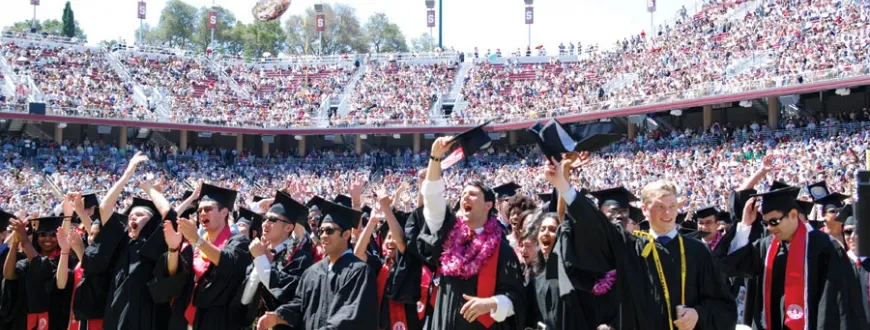Table of Contents
Many millennials entered adulthood during this era and it is unsurprising that they are less trusting of others than any other living generation. This distrust in institutions is complemented by financial insecurities: while 83 percent of college seniors indicated that they would make more than $25,000 per year, 41 percent of college graduates make less than that amount. Rife with economic insecurities, millennials turn to their ballots to institute hedges in the government against such insecurities – after all, the government is not profit-driven like the corporations that left many Americans without jobs in 2009. It is understandable that more than two thirds of millennials in a recent Gallup poll supported a government that would provide a higher minimum wage for its citizens.
Stanford, among other top-tier schools, retains its promise to students of being an exception to the economic hardships that millennials face. The university boasts an average starting salary of $62,900 for its graduates, and an average of more than $126,000 towards mid-career. These salaries, along with Stanford’s generous financial aid program, help most Stanford students to become partially immune to the high student debt that many students at other schools struggle with for decades.
In a recent survey of more than 150 Stanford students, more than 80 percent of respondents indicated that the government should provide a minimum wage to its citizens. Stanford students are unlikely to need the minimum wage themselves, and some of their support for such a policy can be attributed to the Keynesian belief that citizens with more disposable income will spur economic growth. However, we cannot discount the role of empathy – the belief that compassion for others living in lower socioeconomic positions should drive policy – in shaping their opinions. David Grusky, director at Stanford’s Center for Poverty and Inequality, claimed that the current low minimum wage in California creates “the land of working poverty”. This statistic aligns with the national millennial view of government intervention in business as a means to provide for its citizens, which is representative of a view that citizens with little or no income should have their basic needs met.
However, in the same survey, less than 40 percent of respondents claimed that nepotism, the practice of favoring friends and family in a corporate setting, should be illegal for private companies. Government prohibition of nepotism seems to be a natural corollary for those that support government economic intervention to provide equal opportunities for its citizens: if nepotism is disallowed, companies would be forced to hire candidates who are more likely to be objectively qualified, independent from their relationships with those at companies, which would provide fairer opportunities for job candidates. This seems to present a strange paradox: Stanford students support government intervention when it comes to minimum wage, but not when it comes to nepotism.
While most Stanford students will not personally experience the minimum wage and low income jobs like other millennials after college, their empathy extends to those who are in such positions. Nepotism, on the other hand, is a practice that many Stanford graduates benefit from – their friends and family are often in privileged positions at companies. Stanford graduates need not hedge against the downsides of nepotism, since it often benefits them. One possible explanation for the disparity in support for the minimum wage and nepotism is that the minimum wage provides more objective social good than the prevention of nepotism. Alternatively, it raises questions about the consistency of liberal views at Stanford: it is possible that for many Stanford students, their economically liberal empathy extends only as far as it coincides with their personal advancement.
This is not an unusual trait of many liberals today, who encourage their fellow citizens to extend their empathy beyond their personal family, friends, and community to the wider national and international communities: in 2006, Obama famously said in a speech “When you choose to broaden your ambit of concern and empathize with the plight of others, whether they are close friends or distant strangers – it becomes harder not to act; harder not to help.” This could explain why liberals tend to support national economic stimulus packages and redistributive tax systems. It could also explain why many liberals support policies that benefit others at a low personal cost, such as the legalization of drugs, gay marriage, and abortion. However, if their personal interests are at stake, the same voters may choose rules that benefit themselves, their family, and their friends.
The inconsistency between the popular economic views of students suggests that there may be some inconsistencies within the liberal ideology at Stanford. Every ideology has some inconsistencies, but Stanford students should be aware how easy it is to adopt a hypocritical position when developing their political views.





